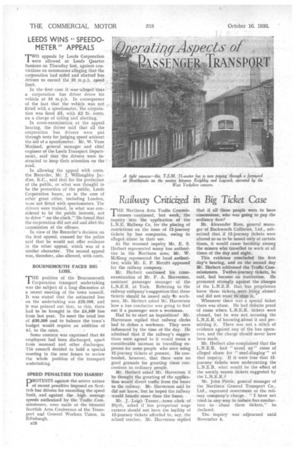Railway Criticized in Big Ticket Case
Page 66

If you've noticed an error in this article please click here to report it so we can fix it.
'THE Northern Area Traffic Commis1 sioners continued, last week, the inquiry into the 'application of the L.N.E. Railway Co, for the placing of restrictions on the issue of 12-journey tickets by bus companies, owing to alleged abuse in their use,
At the resumed inquiry Mr. g, S. IIerbert represented many bus authorities in the Northern. area Mr_ W. McKeag represented the local authorities; while Mr. E. P. Merritt appeared for the railway company_
Mr. Herbert continued Isis. crosSexamination of Mr. P. A. Halverson, assistant passenger manager • of the L.N.E.R. at York Referring to the railway cmhpany's suggestion that these tickets should be issued only ?o workmen, Mr. Herbert asked Mr. Harverson how a bus conductor was going to find Out if a passenger were a workman: • Hail he to start an inquisition? Mr. Harverson replied that railway clerks had to define a workman. They were influenced by the time of the day_ He admitted that if the railway's suggestions were agreed to it would mean a considerable increase in travelling expenses. for some people who were using /2-journey tickets at present. He contended, however, that there were no good grounds for granting these concessions to ordinary people.
Mr. Herbert asked Mr. Harverson if he thought the granting of the application would divert traffic from the buses to the railway. Mr. Harverson said he did not know, but he hoped the railway would benefit more than the buses. • Mr. J. Leigh Turner, town clerk of 13lyth, asked if Jess prosperous wage earners should not have the facility of 12-journey tickets afforded to, say, the school teacher, Mr. Harverson replied that if all these people were to have c.oncessions, who was going to pay the ordinary fare?
Mr. Alexander Ross, general manager of Backworth Collieries, Ltd., submitted that if 12-journey tickets were altered so as to be issued only at certain times, it would cause hardship among the miners who travelled to work at all times of the day and night.
This evidence concluded the first day's hearing, and on the second day Mr. Herbert addressed the Traffic Commissioners. Twelve-journey tickets, he said, had become an institution. He protested strongly against the charges of the L.N.E.R. that bus proprietors knew these tickets were being abused and did not want tOntop it.
Whenever there was a special ticket there was abuse. He had definite proof of cases where L.N.E.R. tickets were abused, but he was not accusing the L.N.E.R. of knowing about it and permitting it. There was not a stitch of evidence against any of the bus operators, and the charge should never have been made.
Mr. Herbert also complained that the L.N.E.R. had "saved up" cases of alleged abuse for " mud-slinging " at that inquiry. If it were true that 12journey tickets were undercutting the L.N.E.R. what would be the effect of the weekly season tickets suggested by the L.N,E.R.?
Mr. John Petrie, general manager of the Northern General Transport
Ltd.; expressed resentment at the railway company's charge. " I have not tried in any way to induce bus conductors to abuse these tickets," he declared.
The inquiry was adjourned until November 4.








































































































